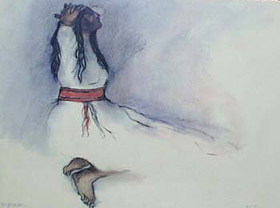 |
 |
 |
 Vallarta Living | Art Talk | November 2005 Vallarta Living | Art Talk | November 2005  
R.C. Gorman; Native American Artist's Portrayals of Navajo Women Were Highly Popular
 Jon Thurber - LATimes Jon Thurber - LATimes


| | His portrayal of Navajo women by use of flowing lines and appealing colors are very recognizable in the art world. | 
| | A full-blooded Navajo Indian by Birth, he had been called the Picasso of the Southwest. |
One of the traditional symbols of the Day of the Dead holiday, the painted sugar skull, is being pushed into extinction, say artisans in Toluca, in the State of Mexico.

At the annual fair of alfeñique the art of decorating sugar figures has been ceding more space to the increasing popularity of decorated figures made of chocolate, amaranth and clay, rather than the traditional sugar skulls.

In Toluca, nine families of artisans still create figures of the original material, in spite of minimal government support, dropping sales and meager profits.

Wenceslao Rivas Malagón, 35, is a third-generation sugar artisan. For decades, his family has been dedicated full time to creating figures related to the Day of the Dead out of sugar.

Fighting For A Fair Price

Rivas said that his family struggles to get a fair price for their creations. "Each year we watch with sadness as skulls made with other substances gain presence; the true tradition of alfeñique that makes skulls, witches, coffins, skeletons, sheep and pumpkins of sugar is dying out," he said.

The nine families that still make figures in the style of their grandparents say that most of their sales are to large department stores and foreign buyers.

"The pay for our work is unfair. We work up to three days to finish a large painted skull which sells for maybe 300 pesos (US28), while people working in chocolate or amaranth only need one or two hours and the cost of their product is up to 900 pesos (US83)."

The Alfeñique fair runs through November 4 in downtown Toluca.

Another factor that is hurting the industry are also cheaper and more exuberant imports from the United States, according to manufacturer David León.

León, who has been making sugar skulls for more than 20 years, says the market cannot compete with mass market imports arriving from across the border which is putting local artisans out of business.

"When they mass produce these sugar skulls in factories, it's impossible for us to undercut their prices," León complained. | 
 | |
 |



